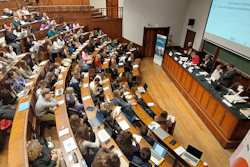In April 2024, the UnaVEx partners met in person for the first time in Johannesburg. Tell us about the experience.
Lee-Ann Modley: It was incredible. It was important to solidify what was already a great working relationship and feel the energy that everyone exudes – not just put faces to names but personalities to names. We’d been working together for six months, but in different countries. The human aspect had been missing from the project. Meeting in Johannesburg was the cherry on the cake: now we've met everyone, we've established a relationship beyond virtual meetings.
What really stood out for me is the respect that colleagues have for each other's ideas. As a young academic, sometimes people look down on your contributions but [during the UnaVEx meetings] people supported each other's ideas and really listened to one another.
Hanna Lappaleinen: I totally agree with Lee-Ann. It was a great kick-off – even better than I expected. This is a challenging project; virtual exchanges are not the easiest formats to implement. But now I'm optimistic for the implementation of this project.
It’s important for this kind of virtual exchange that we learn about each other's history and background. As part of the programme Lee-Ann organised, we visited Soweto and Mandela House. It was an experience that opened our world views.
Hanna, as project coordinator, can you tell us a little bit about how the project came into existence?
Hanna: We started working on this virtual exchange concept a few years ago. With colleagues from Armenia, Denmark and Ukraine, the Helsingin yliopisto/Helsingfors universitet developed a proposal for the Climate University for Virtual Exchange (CLUVEx) project under the Erasmus+ Virtual Exchange pilot. CLUVEx aims to equip students from European and Neighbourhood-East universities with climate competencies.
When CLUVEx succeeded in securing a grant, my Helsingin yliopisto/Helsingfors universiteti colleagues were excited to respond to the next Virtual Exchange call in collaboration with fellow Una Europa partner universities and members of the Una Europa–Africa Partnership. I was amazed that we succeeded in securing this grant a second time. While CLUVEx focuses on climate change, UnaVEx is more focused on sustainability, building on the Una Europa Micro-credential in Sustainability.
" Sustainability should be taught in a way that impacts students’ hearts, heads, and eventually their hands – they get involved in practical ‘eco-actions’. It won't always be on a grand scale but leaving the course you will have at least one action that you can readily implement in your country, in your city, or even in your house – whether you are in Helsinki or Nairobi. "
Lee-Ann Modley
UnaVEx Academic Lead, University of Johannesburg
Virtual exchange is an exciting area. What opportunities does it open up? What challenges do you foresee?
Hanna: The number of massive open online courses (MOOCs) is increasing. But these studies can be quite lonely. Alongside MOOCs and other kinds of distance learning, we need to develop instruments that give students more room for interaction and discussion. That’s why there’s significant momentum for a project like UnaVEx.
There are very practical challenges to consider. Are the students in the same time zone? Do we need to provide language skills support? And there are technical challenges, too – we’ve discovered, for example, that some students will connect using mobile phones rather than laptops; this can put some limitations on what we can do when we are all online.
Lee-Ann: We also need to consider the socioeconomic dynamics that make it difficult for a project like this to be inclusive. In South Africa, for example, we have issues with load shedding [i.e. distributing power demand among multiple generators so that no one generator is overloaded] which may mean sometimes students can't join on time. In other African countries, it could be things like students going home to villages during the holidays where there are no connection points or Internet connectivity. These kinds of challenges are outside the scope of the project but they’re very real barriers that could affect delivery of the virtual exchange.
What are you most excited about working on during this project?
Lee-Ann: It's exciting to be bringing these two continents together. Often, we’re learning about sustainability and climate change issues through a lens that is not always applicable to our situation in the Global South. Even when we look at textbooks and how we traditionally teach our students, it’s not from an African point of view. It’s not from an indigenous knowledge point of view.
What really excites me about the UnaVEx project and the topics we will be addressing is the fact that people from Africa will have a chance to voice their opinions and experiences and do so on a platform where other people can say “Oh wow, it's different in Europe” or “It's nothing we’ve experienced here”. For me, that cultural exchange is one of the most valuable parts of the project.
What impact do you hope UnaVEx will have for students and, more broadly, for sustainability?
Hanna: Of course, I hope this will be a successful project and that we reach the project aims. But in the long run I hope that our examples and lessons learnt from UnaVEx can be scaled up and applied to other projects. We’re the first ones to do this, but I hope there will be a continuation.
Lee-Ann: Hopefully delivering this virtual exchange will spark a tangible interest in sustainability – students will discover how they can make a difference. One of our colleagues, Laura [Riuttanen, Lecturer in Atmospheric Sciences at the University of Helsinki], spoke about how sustainability should be taught in a way that impacts students’ hearts, heads, and eventually their hands – they get involved in practical ‘eco-actions’. It won't always be on a grand scale but leaving the course you will have at least one action that you can readily implement in your country, in your city, or even in your house – whether you are in Helsinki or Nairobi.




